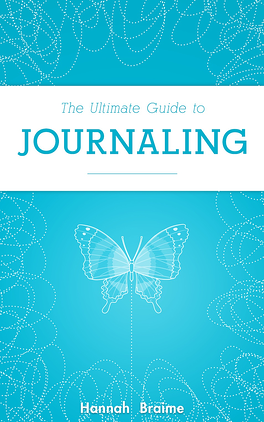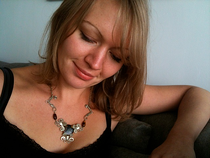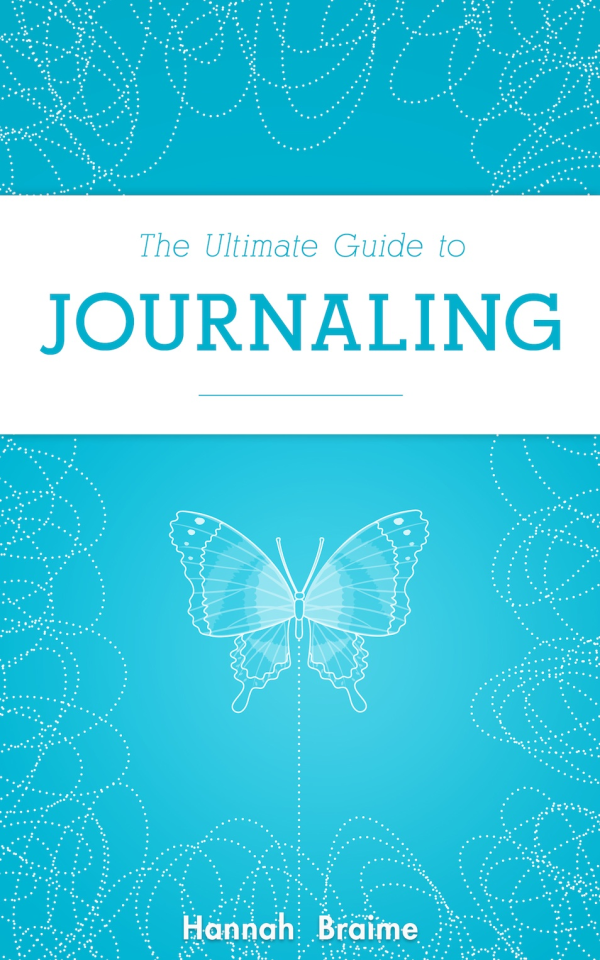By Hannah Braime
What does your journal mean to you?
 To me, my journal is a gateway to my authentic self. As I explain in my book, The Ultimate Guide to Journaling, I know that without journaling, I would feel less of a whole person because I would know less about myself.
To me, my journal is a gateway to my authentic self. As I explain in my book, The Ultimate Guide to Journaling, I know that without journaling, I would feel less of a whole person because I would know less about myself.
Since I was a child, journaling has played an active role in my search for who I am and what it means to be ‘me’. Over the course of nearly 20 years, my various journals have been a source of solace in difficult times, a tool for insight and self-knowledge during periods of change or re-evaluation, and a celebration of the many things for which I am grateful.
How it all began
My exploration of journaling began when I was very young. The initial foray involved keeping a record of what I’d done each day and my reactions to it. I can recall two important things I took from the experience:
1. Journaling is an exercise in catharsis (although obviously I didn’t have a word for it at the time!)
2. Taking time to introspect - no matter how brief - feels incredibly meaningful.
Around this time, I also discovered the value of what I call “retrospecting” - reading back over my entries from previous weeks or months. Even then, it was fascinating to see what I had been doing, thinking and feeling several weeks or months beforehand. Reading back over what I had written in my very first journal, I felt more connected to my experiences, and more connected to myself.
A new direction
The power of journaling and its use as a tool for healing and growth became clear to me in my late teens and early twenties. This was a time of much upheaval and change in my life. I was going through a difficult break-up, becoming disillusioned with my university course, struggling financially and re-evaluating what kind of career I wanted. Over a period of less than two years, the entire direction of my life changed; for the better, but not without much soul-searching, value-seeking and, as a consequence of those activities, some of the most difficult decisions I hope I’ll ever have to make.
Up until this point, my journaling had been reasonably superficial. Mostly, because I was afraid to dig deeper and unearth what was underneath. At this juncture, however, that all changed.
When everything around me was in flux, I knew I could always go back to my journal, and therefore myself. At a time when I was experiencing a lot of external pressure and disruption, I found through journaling the one person I could depend on to be there for me when I most needed it: myself.
I didn’t “enjoy” journaling during this time. My time spent sitting with an open notebook or blinking cursor became more like a gruelling mental gym session than an afternoon at the spa. But, like regular gym sessions, sitting with that discomfort helped me develop the internal strength and self-knowledge that up until that point I had, frankly, been lacking.
“The Ultimate Guide to Journaling”
During this time, I wanted to read everything I could find about journaling and its applications. I found valuable fragments of advice and suggestions in many places, that helped me take my own journaling to the next level. Realising what a difference this information had made to me, I wanted to pull everything I had learned together into one resource - the guide I wish I had when I first started. The Ultimate Guide to Journaling represents everything I have learned so far on my journey, and I hope that the guidance within can make as much of a difference to others as it has to me.
Of course, journaling is a different experience for everyone, and trying to write a prescriptive ‘how-to’ book would be trying to squeeze 90% of future readers into an ill-fitting box. With that in mind, The Ultimate Guide to Journaling is not prescriptive. Instead, it provides a range of journaling possibilities, including over 100 prompts and suggestions for written and art journaling, with the aim of giving readers a choice and allowing them to create their own journaling practice - one that is right for them.
In the book, I attempt to answer all the questions I myself asked about journaling, including how often to journal, what to use, how to get in the right headspace, and more. My aim is to give new journalers the confidence to use this tool on their terms, and provide seasoned journalers with further suggestions and tips they can use to expand their practice.
Our journals are both vessels for recording our lives, and future teachers of the truth - with unlimited potential.
Bio
 Hannah runs Becoming Who You Are, the guide to authentic living. She is passionate about helping people create the lives they want from the inside out using a rational approach to personal development. The author of two published books, including The Ultimate Guide to Journaling, she coaches and offers resources on authentic living through www.becomingwhoyouare.net. Connect with her via her website, on Facebook and Twitter (@becomewhour).
Hannah runs Becoming Who You Are, the guide to authentic living. She is passionate about helping people create the lives they want from the inside out using a rational approach to personal development. The author of two published books, including The Ultimate Guide to Journaling, she coaches and offers resources on authentic living through www.becomingwhoyouare.net. Connect with her via her website, on Facebook and Twitter (@becomewhour).
What does your journal mean to you?
 To me, my journal is a gateway to my authentic self. As I explain in my book, The Ultimate Guide to Journaling, I know that without journaling, I would feel less of a whole person because I would know less about myself.
To me, my journal is a gateway to my authentic self. As I explain in my book, The Ultimate Guide to Journaling, I know that without journaling, I would feel less of a whole person because I would know less about myself.Since I was a child, journaling has played an active role in my search for who I am and what it means to be ‘me’. Over the course of nearly 20 years, my various journals have been a source of solace in difficult times, a tool for insight and self-knowledge during periods of change or re-evaluation, and a celebration of the many things for which I am grateful.
How it all began
My exploration of journaling began when I was very young. The initial foray involved keeping a record of what I’d done each day and my reactions to it. I can recall two important things I took from the experience:
1. Journaling is an exercise in catharsis (although obviously I didn’t have a word for it at the time!)
2. Taking time to introspect - no matter how brief - feels incredibly meaningful.
Around this time, I also discovered the value of what I call “retrospecting” - reading back over my entries from previous weeks or months. Even then, it was fascinating to see what I had been doing, thinking and feeling several weeks or months beforehand. Reading back over what I had written in my very first journal, I felt more connected to my experiences, and more connected to myself.
A new direction
The power of journaling and its use as a tool for healing and growth became clear to me in my late teens and early twenties. This was a time of much upheaval and change in my life. I was going through a difficult break-up, becoming disillusioned with my university course, struggling financially and re-evaluating what kind of career I wanted. Over a period of less than two years, the entire direction of my life changed; for the better, but not without much soul-searching, value-seeking and, as a consequence of those activities, some of the most difficult decisions I hope I’ll ever have to make.
Up until this point, my journaling had been reasonably superficial. Mostly, because I was afraid to dig deeper and unearth what was underneath. At this juncture, however, that all changed.
When everything around me was in flux, I knew I could always go back to my journal, and therefore myself. At a time when I was experiencing a lot of external pressure and disruption, I found through journaling the one person I could depend on to be there for me when I most needed it: myself.
I didn’t “enjoy” journaling during this time. My time spent sitting with an open notebook or blinking cursor became more like a gruelling mental gym session than an afternoon at the spa. But, like regular gym sessions, sitting with that discomfort helped me develop the internal strength and self-knowledge that up until that point I had, frankly, been lacking.
“The Ultimate Guide to Journaling”
During this time, I wanted to read everything I could find about journaling and its applications. I found valuable fragments of advice and suggestions in many places, that helped me take my own journaling to the next level. Realising what a difference this information had made to me, I wanted to pull everything I had learned together into one resource - the guide I wish I had when I first started. The Ultimate Guide to Journaling represents everything I have learned so far on my journey, and I hope that the guidance within can make as much of a difference to others as it has to me.
Of course, journaling is a different experience for everyone, and trying to write a prescriptive ‘how-to’ book would be trying to squeeze 90% of future readers into an ill-fitting box. With that in mind, The Ultimate Guide to Journaling is not prescriptive. Instead, it provides a range of journaling possibilities, including over 100 prompts and suggestions for written and art journaling, with the aim of giving readers a choice and allowing them to create their own journaling practice - one that is right for them.
In the book, I attempt to answer all the questions I myself asked about journaling, including how often to journal, what to use, how to get in the right headspace, and more. My aim is to give new journalers the confidence to use this tool on their terms, and provide seasoned journalers with further suggestions and tips they can use to expand their practice.
Our journals are both vessels for recording our lives, and future teachers of the truth - with unlimited potential.
Bio
 Hannah runs Becoming Who You Are, the guide to authentic living. She is passionate about helping people create the lives they want from the inside out using a rational approach to personal development. The author of two published books, including The Ultimate Guide to Journaling, she coaches and offers resources on authentic living through www.becomingwhoyouare.net. Connect with her via her website, on Facebook and Twitter (@becomewhour).
Hannah runs Becoming Who You Are, the guide to authentic living. She is passionate about helping people create the lives they want from the inside out using a rational approach to personal development. The author of two published books, including The Ultimate Guide to Journaling, she coaches and offers resources on authentic living through www.becomingwhoyouare.net. Connect with her via her website, on Facebook and Twitter (@becomewhour).

Leave Comment